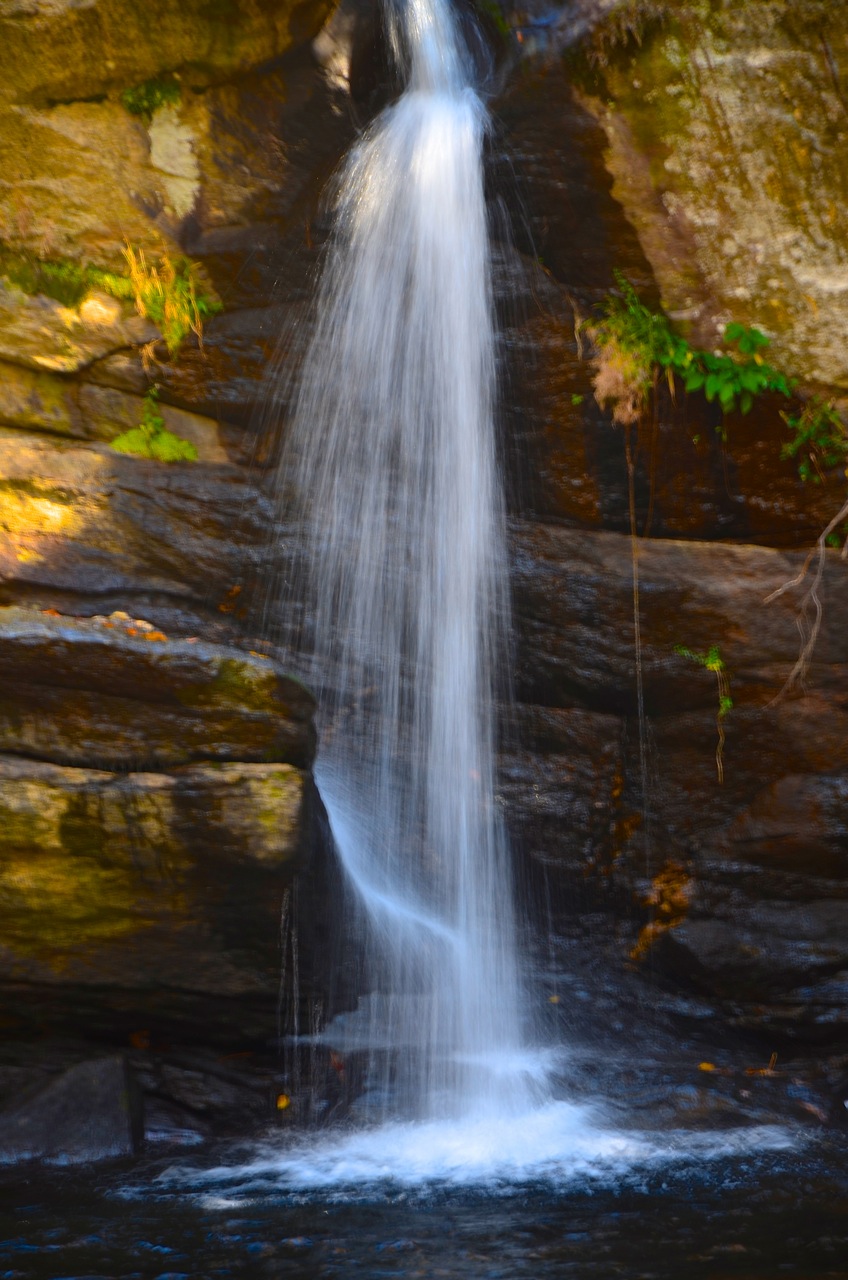By David Underhill –
When Caesar made himself emperor of Rome he spayed and neutered the senate – but kept it alive as a pet in remembrance of the extinguished republic.
When the Alabama legislature put constitutional Amendment 2 on the ballot for this year’s general election, it set in motion the mechanism for privatizing the state’s parks – while retaining the name that disguises them as public facilities.
The legislature’s allies in this verbal sleight of hand include the Department of Conservation and Natural Resources (DCNR), which oversees the parks, the Newhouse family’s Al Dot Com, the online ghost of withered newspapers in major cities of the state, numerous local notables, plus Alabama bred Harvard celeb biologist E.O. Wilson, and many conservation organizations.
This is happening because the alleged representatives of the people at the capitol in Montgomery refuse to treat the parks as a service the public deserves. They won’t fund the operation and maintenance of the parks from general revenues. The budget comes mostly from fees for entering the parks, for using campsites, lodges, golf courses and other amenities. And even these receipts are targets of legislative raids to finance functions apart from parks.
Stop Me Before I Filch Again
The raids depleted the system’s personnel and resources so deeply that several parks closed last year, while others whittled away open hours and services. This provoked such a statewide shriek that two things occurred: The shut parks eventually reopened “under new entities, including city and county governments” as Al Dot Com delicately put it, without mentioning that these new entities also include a profit seeking private corporation. And the legislature concocted Amendment 2 which, if passed by the voters on November 8, will prohibit the legislature from snatching the parks’ funds again.
The measure putting this on the ballot for ratification by the public passed the house and senate in Montgomery by large majorities, indicating that the legislature could easily have enacted a law prohibiting themselves from future grabs of park money. Apologists for them might say this was such a momentous issue that the legislators rightly referred the decision to voters as a constitutional amendment, which would be harder to reverse in years ahead than a mere law.
If that was the legislators’ true motive, they would have proposed an amendment providing exactly and only for the parks to keep the fees they collect. They didn’t take this clear, simple approach because they also wanted to do something else that did indeed require a constitutional amendment.
In the government-despising, business-worshiping Reagan era private companies were allowed to run some of the largest, most prosperous facilities within the state parks – hotels, restaurants, golf courses. These firms did what they are designed to do, make money by taking in as much as possible and spending as little as possible, especially by neglecting maintenance.
The result was such tattered facilities that the state resumed control and secured passage of a constitutional amendment in 1998 authorizing the sale of $110 million in bonds, mainly for resurrection of the parks – with the stipulation that any facility revived by money from these bonds must be run “exclusively and solely” by the DCNR, so that private companies could not slip back in and repeat the plunder.
This constitutional restriction is what the legislators want to abolish, and they could do that only by another amendment voiding the restriction. Standing alone this maneuver would be too obvious and unpopular. So they sought to accomplish repeal of the restriction by attaching it to an attractive amendment, the one protecting the parks’ funding from legislative raids.
Constitutional Suppository
Various images comes to mind for describing this procedure. One is a lubricant applied to a suppository to ease its insertion.
Many citizens are accepting the treatment with a smile. They want to protect the parks, they have read or heard that Amendment 2 will stop the politicians in Montgomery from skimming off the parks’ money, and so they will vote Yes. Others confess, in social media and elsewhere, to being confused by the amendment because it begins with shielding the parks’ revenues but ends with verbiage about repealing another amendment regarding various facilities within the parks. But the confused are tempted to focus on the protective language and vote Yes.
A famous figure who attaches his name, as E.O. Wilson did along with two other biologists (actual authorship is unclear), to an Al Dot Com op-ed in favor of the amendment should look closer at what he is asking voters to support. The text is a hymn to the glories and value of the parks and the need to secure their funds. It says nothing about the clauses allowing private operators to return. Wilson is long retired from teaching and resides in a Massachusetts assisted living home. Some of his analytical rigor may have seeped away.
Another highly visible supporter of the amendment is a prominent restaurant operator. He may genuinely appreciate the state parks, but campaigning for Yes votes also positions him well to take advantage of an opportunity to plant his restaurants inside them.
Among Alabama’s enviro orgs there are some enthusiastic advocates for Amendment 2, some wary supporters, and a few outright No voices. The wary ones concede it would have been better for the ballot to show an amendment that dealt only with guarding the parks’ money from legislative raids. But since that choice isn’t available on election day, they are inclined to vote Yes and then to remain vigilant in coming years against any attempts to slide the private operators back into the parks.
Such vigilance won’t be necessary, say the leading Yes-men. Chief among them has been Greg Lein, director of DCNR’s state parks division. He points out that Amendment 2 does not mandate bringing private companies into the parks. It merely makes this an option, and “it’s not like we have a list of sites where we want to do that,” he reassures. But circumstances might arise where this makes “smart business sense.”
Privatizing Pilot Project
For an example he cites Roland Cooper park on the Alabama river between Montgomery and Mobile. It closed during the budget squeeze. But it had never received any of the 1998 bond money, so it could invite private vendors to run services within the park under a decades-old concessions act.
DCNR selected a vendor, Recreation Resource Management of America (RRM), headquartered in Arizona and operator of thousands of campsites in national forests and elsewhere. The park was weedy and unkempt from the closure. DCNR proudly reports that it brought in crews from other parks to “assist the RRM team in getting the property ready” to reopen.
This means the Alabama park system used publicly funded personnel to improve a park, while handing the keys to a private company to make money off the improvements – and DCNR is congratulating itself for doing this.
DCNR has been less vocal about the specific terms under which RRM is running the park. A look through several state websites concerning parks revealed nothing pertinent. And the state’s media have not examined this either.
Presumably RRM intends to profit from the Alabama park it has acquired. Raising prices for use of the park might seem the quick and easy way to do this. Whether price gouging is prohibited by RRM’s agreement with the park system is not apparent from readily available sources. But any price increases tend to drive poorer citizens away. At some point a park remains a public place in name only, while in practice it becomes a preserve for wealthier folks.
But one financial consequence is obvious without searching out detailed documents: Profits made by RRM at Alabama’s Roland Cooper park won’t stay there. They will be whisked off to company headquarters in Arizona. And if Amendment 2 passes, private companies will have legal permission to run the major facilities within Alabama’s much larger parks too. The profits made from these attractions won’t stay there either. They will go into company officials’ pockets.
The result would be the opposite of what voters are being told. The sales pitch for Yes on Amendment 2 is its guarantee that politicians can’t deplete the parks by diverting user fees elsewhere. But it also guarantees that private companies will have permission to divert to their executives and shareholders the profits drained from the parks.
Reading the Caution Signs
This will happen if the state’s officials allow it – and the signs are they do intend to deliver the parks’ most lucrative features to business interests.
First, because the advocates for Yes votes have consistently steered public attention away from the facilities that would truly be affected by passage of Amendment 2 and toward facilities portrayed falsely as in jeopardy if it fails.
The text of the amendment gives DCNR “the option to provide for the operation and management by non-state entities, of hotels, golf courses, and restaurants at any applicable state parks,” meaning those receiving the 1998 bond funds. The Yes spinners rarely or never speak of these facilities. Instead they concentrate on fictional threats to lesser but popular amenities if the amendment fails.
The lead sponsor of the legislation putting Amendment 2 on the ballot, senator Clay Scofield, ran an op-ed about it on a website called Alabama Today. He details the park system’s financial crisis, reviews the amendment’s provisions, and scolds its opponents. But nowhere does he say a word about the golf courses, hotels, and restaurants that DCNR could hand over to private companies if the amendment passes. Instead he speaks fondly of Roland Cooper park reopening under private auspices, of ziplines and other appealing amenities run by private businesses throughout the park system, as if these things would be in danger if voters defeat the amendment.
They would not be. They were all arranged under the concessions act, which is not affected by whether Amendment 2 passes or not.
State parks director Lein performed a similar scare – with assistance from Al Dot Com – at a Yes rally in Oak Mountain park, metro Birmingham’s cherished memory of nature lost.
The Al Dot Com story of this event recited standard pro and con arguments about the amendment, with much more attention to the Yes side. It ended with a report on a “cable-towed wakeboarding” operation in the park, which gives boatless urbanites the thrill of riding a slab around a lake behind a speeding ship, for a fee. It quotes the owner of this business about how much the deal benefits him and the public. Then it quotes director Lein speaking as if the failure of Amendment 2 would force this popular private vendor out of the park, leaving state incompetents in charge: “The last thing I want to do is ask my staff to wear dozens of different hats. To suddenly ask them to become experts on cable skiing? No. We’re not going to do that.”
But nobody would ask them to do that. The wakeboards entered the park under the concessions act, and they can stay whether Amendment 2 passes or fails.
In case these phony frights are not enough to pass the amendment, the Yesters have even hinted that without passage the system could suffer a terminal financial collapse, closing all the parks. This is a fake Halloweenish scare. The Republican-dominated government would commit political suicide by doing it. Reactions would be so fierce that the Democrats could reclaim the governor’s mansion and the statehouse.
Hiding the Hook
Second, the Yes pushers have insisted that the amendment doesn’t amount in any way to a step toward privatizing the parks, as some opponents charge. They doth protest too much, methinks.
Amendment 2 sponsor Scofield declares that it “does not privatize the parks … at no time does the park system lose ownership of a park or park facility” by letting private vendors run them. And director Lein argues that the amendment won’t privatize the parks, since “that word does not even appear in the language” on the ballot, as if DCNR – which contains a fisheries department – is unaware that fish are caught by concealing the hook with bait.
Like Caesar’s sham senate, the state can hold formal ownership of a park while the prime facilities are surrendered to private operators without the word “privatize” being uttered or written. Officially these places would still be public, actually they would not be. They would remain public only in the sense that anybody may go there – if they can afford the fees. State park users don’t first have to be accepted into membership by a board or other screening mechanism, as is customary with country clubs, hunting clubs and beach clubs. But the fees will rise to provide the extracted profits, and this will shut out the layers of the public most in need of relief from their daily scrambles and least in reach of alternatives to the parks. For them the parks will have been privatized, regardless of whether that word ever appears.
Hocus Focus
Third, the Yes team deploys the vocabulary of business to discuss the fate of public parks. Their articles and remarks are sprinkled with references to bottom lines, to sound business standards, to economic common sense, to financial stability, to public-private partnerships, to budget predictability, to customers and consumers rather than citizens.
This is the language of people who have forgotten – and now are trying to train the rest of us to forget – that government must do some things other than ape the ways of commerce. They grant that a few functions like cops, courts, prisons, war must be conducted without grieving too much over the costs. But almost everything else is a candidate for the discard bin unless it turns a profit.
With such attitudes at epidemic levels in official ranks, passing a constitutional amendment that gives park authorities the option of privatizing the system’s biggest money spigots nearly assures that this is what they will do.
And as Amendment 2 takes effect, please don’t anybody be shocked and surprised when some officials vanish from public service only to reappear in private service at the executive levels of the companies assuming control of the parks – for higher salaries, no doubt.
Disaster Capitalism Comes Home
When a process like this occurs in some faltering foreign country, it is called disaster capitalism – natural calamities or economic and political bungles damage public institutions beyond easy repair and private enterprise swoops in, claiming the role of savior amid the wreckage. Just as the methods and machinery of warfare abroad appear now in police practices at a North Dakota pipeline dispute, so does disaster capitalism arise within America.
Alabama’s Amendment 2 is one item among many related developments. The national parks are also being privatized piece by piece. Schools and prisons are becoming investment choices. More and more public lands are opened to oil drillers, miners, loggers and livestock grazers.
The message woven into these events is that money reigns as the supreme value. Things that make money may proceed, things that don’t may be sacrificed.
This creed obliterates much of what makes life worth having for those who can’t provide essentials from their individual resources. That describes most of us. Unlike Hillary or Donald, we must rely on communal resources or we’ll lead a shabby life slogging from day to day.
Having access to pleasant, well-kept parks isn’t a demand for luxury or frills. E.O. Wilson says humans were made to thrive in nature. “Biophilia” he calls it. Separated from their natural habitat, people become literally ill and impaired.
Separation from opportunities for education has similar results. So would the loss of many other governmental functions that don’t make money but do make life livable.
Alabama’s Amendment 2 and all kindred measures creeping into public affairs are an attempt to deny this aspect of humanity. They ratify the belief that certain vital activities are unworthy of support from general revenues and must survive on user fees or die. A Yes vote on this constitutional amendment embraces the wretched notion that if you can’t personally pay for a decent life, you don’t deserve one.
More Photos




















Excellent and informative article!
In fact, if any liberal trial lawyers are paying attention, this Amendment 2 appears clearly to be unconstitutional, in that it says it will keep the proceeds from the parks in the parks, but gurantees the profits will be funneled out.
Any Democrat, independent or so-called environmentalist who votes for this is literally bowing down to the Big Business Republicans like the poor German people did to Hitler.
“Yes, Master, this is the best compromise we can get.”
Really?
I say vote it down on Tuesday and be there when the Legislature goes into session next year and fight for what you believe in. Let the parks live to fight another day. Don’t give them up to private, corporate interests for the next 99 years!
Is your memory so short that you have forgot about 5 state parks closing last year due to the continuous raids on the park system’s user fees?
I do not see private concessionaires as a problem considering state employed park managers and rangers still call the shots. Park facilities run by the state are also run down because they have never received adequate funding.
Regardless, the legislature has made it clear that they do not see state parks as a essential service, and will take all their money for other uses (even if the parks close) in efforts to avoid raising taxes which IS sacred to them.
I know State Park Director, Greg Lein, from way back when he worked for State Lands, you probably do not. He is as strong a conservationist as they get. I was heavily involved as a volunteer in the fight last year to keep the legislators from stealing so many users fees that it would have closed the system. At best we minimized the stealing and closing. You probably were not involved in that effort.
If you want play chicken over whether the state parks will close if their user fees keep getting stolen then vote No and see if the park system is still open in a few years. Those of us who have worked to keep state parks open during these raids are voting Yes on Amendment 2.
I don’t think you actually read any of our coverage, because we do not have a short memory. These things are addressed in the articles.
I understand you learned about comments from Newhouse’s Al Dot Com, which allows any old crazy attack comment to be published. We demand a higher level of dialogue.
If you don’t see private concessionaires as a problem, perhaps you should look at the $12 billion backlog of maintenance for the national parks and how Delaware North is sucking the profits out of Yellowstone, Shenandoah and the Grand Canyon.
The Problem of Over Commercialization and Privatization of the National Parks
Actually, the parks did fine when Gulf State Park was highly profitable before Hurricane Ivan and helped subsidize the other parks. The parks don’t get tax money. The money comes from park fees.
You might want to check before you attack me for not being involved. I didn’t write this article, David Underhill did, but we have both been involved in these fights for many years. I was there writing about it in the 1980s when Republican Guy Hunt in the Reagan years privatized the state parks the first time. I saw what happened when they sucked all the profits out and left no money for maintenance. They put nothing back into the parks. I was there when voters passed the bond issue in 1998 and demanded language not allowing the parks to be privatized again.
Where were you when we fought fracking in the Talladega National Forest and won four years ago? You want fracking in the state parks? Trust the Republicans. That’s what you will get.
I talked to Greg Lein when the Commissioner of Conservation refused to take my calls. He is a Republican appointed state employee who did nothing but insult me. I have camped in most of the state parks and photographed them more than any journalist in Alabama over the years. Conservationist is a conservative term for environmentalist. I prefer environmentalist and will continue to actively advocate for a NO vote on Amendment 2. You can’t trust these Reblicans. If you want to save the parks, vote NO and keep fighting to get better people elected and rid the state of the crony capitalism spoils system. We need a merit system in Alabama, but we’ve never had one.